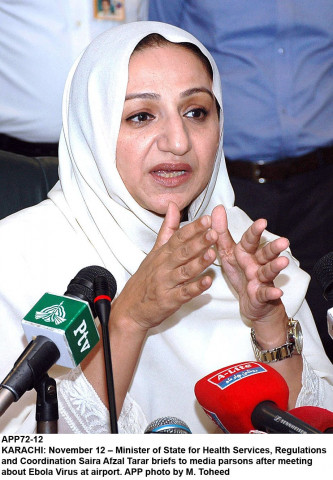India can help Pakistan in its fight against polio: Tarar
Tarar say the two countries should come together to find solutions for diseases such as tuberculosis, AIDS, polio

"The number of polio cases dropped from 60 in 2014 to 21 today," says Tarar. PHOTO: APP
Pakistan is one of only three countries, along with Afghanistan and Nigeria, where polio is still endemic.
Tarar was in New Delhi to attend the fifth meeting of Saarc health ministers. In a recent interview to India's Daily News and Analysis (DNA), Tarar shed light upon how the two countries should come together to curb and find solutions for diseases such as tuberculosis, AIDS, hepatitis and polio.
Tarar had a separate meeting with Indian health minister JP Nadda during which the two discussed how India can aid Pakistan with its share of medical data and technical expertise frequently.
“We will also have one high level meeting every year,” she added.
Read: Bodies of kidnapped polio workers, police guards found in Zhob
Speaking about polio drives in Pakistan, Tarar said, “From 2012 on, certain regions became inaccessible to us; as a result millions of children missed their medicine.”
Hence, referring to Pakistan’s polio problem more of a “political and security concern,” rather than health issue, Tarar recalled how the case of Dr Shakeel Afridi has done long-term damage to Pakistan’s struggle against polio.
Afridi had reportedly helped the CIA with Osama bin Laden’s capture by carrying out a fake door-to-door hepatitis B vaccination campaign.
“That led to resentment in the region against health workers and people stopped letting the Lady Health Workers in their homes,” explained Tarar.
However, now Tarar sees some hope as there is a lot of support from Prime Minister Nawaz Sharif to curb the disease. There is a lot more security provided to the workers to run successful campaigns as law enforcement officials are in the loop who have access to the affected areas.
“The number of cases has come down from 60 in 2014 to 21 today; that’s a big drop,” Tarar stated. “What we need are two or three impressive campaigns to fight this problem.”
Read: Polio: City’s first polio case of 2015
Tarar further added that the much discussed issue about people rejecting polio vaccines on religious grounds is less than 5 percent of the populace. She confirmed that the government authorities were in talks with people who claim the ingredients of the vaccine are haram as well as taking All Pakistan Ulema Council’s scholars on board.
Pakistan’s success story lies in its fight against TB, where the treatment is free for the poorest of the poor as the medical centers are in public hospitals. “It’s a public-private-partnership model, aided by the Global Fund, and our number of cases and mortality rate has come down.”
The message from the SAARC meeting seems to be that the two countries must help each other and cannot possibly solve their problems otherwise.
This article originally appeared on dna



















COMMENTS
Comments are moderated and generally will be posted if they are on-topic and not abusive.
For more information, please see our Comments FAQ